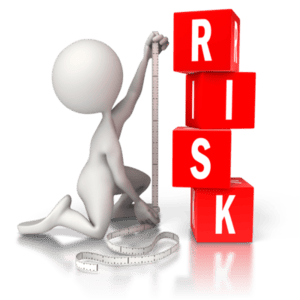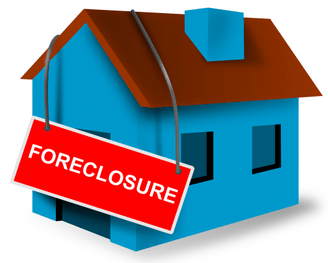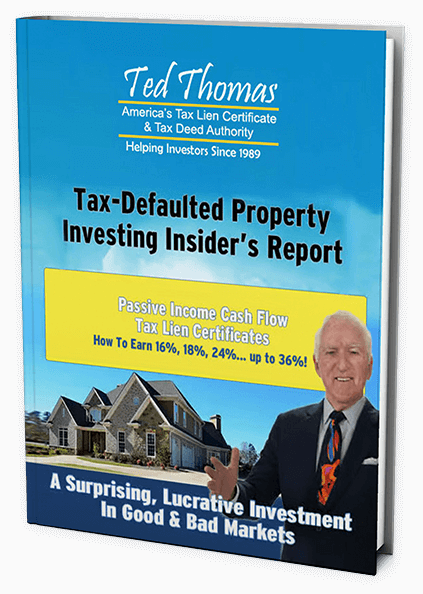“What are the biggest risks of tax lien investing?” is a common question I get. As a tax lien investment expert, I’ve learned where the risks are, what they are and what can be done about them. So let’s talk about the risks of tax lien investing and how they can be avoided or minimized.
The 8 biggest risks of tax lien investing that I’m going to cover are:
- Not Understanding What a Tax Lien Sale Is
- Not Doing Your Homework Before Attending Real Estate Tax Sales
- Bidding on a Tax Sale Property That Is Worthless
- Not Understanding How Tax Lien Auctions Work
- Coming Down With Auction Fever and Overbidding on Tax Liens
- Not Knowing Property Tax Redemption Periods
- Other Delinquent Tax Liens on the Property
- The Tax Delinquent Real Estate Owner Files For Bankruptcy
Risk 1: Not Understanding What a Tax Lien Sale Is
A lot of people get confused and think a tax lien sale and a tax deed sale are the same things. They are not. Here’s an explanation of the two. Knowing the difference is important.
A tax lien sale (property tax sale) is when you purchase a tax lien certificate, which is a lien against a homeowner’s property. As an investor, you collect when the homeowner redeems the lien certificate by paying their back-taxes plus interest and a penalty (the amount of interest and penalty varies from state to state).
Purchasing a tax lien certificate is not the same as purchasing the deed to the property.
A tax deed sale on the other hand, is when the local government has seized the property due to unpaid property taxes, and auctions it off to investors/buyers. In this instance, the investor is purchasing property – albeit for pennies on the dollar.
In some sales, you can take possession of the property immediately. In some, you have to give the owner time to redeem the taxes by paying you for the taxes plus interest.
The tax collector in the community can tell you which kind of sale is held there. They can also explain the other details that follow a successful property tax sale. These after-the-sale matters are critical. If you get something wrong after the sale, you could lose your entire investment.
Risk 2: Not Doing Your Homework Before Attending Real Estate Tax Sales
You need to understand what you are buying, where you are buying, and what you can do with it to mitigate the risks of tax lien investing. This means checking out the property as much as possible.
If you are new to tax sale investing (in either tax liens or tax deeds), start local. Call your tax collector and ask when the next sale will be. Then, ask what properties will be in that sale.
They may not be able to tell you exactly what properties will be planned for the sale until the advertising is underway. When the sale is announced, you can get a complete list of the properties from the tax office or the local newspaper.
When you get that tax delinquent properties for sale list, go and look at the properties that interest you. A good tool to become familiar with is Zillow.
Some questions to ask are:
- What is the house like? Is it in good shape? Is there any obvious exterior damage? The condition of the yard can also give you a good idea of what the house’s inside is like. A well-kept yard means the inside is likely in good shape. A yard that’s a mess indicates the homeowner feels the same about the interior.
- What is the neighborhood like? If you get the house, can you easily sell it or rent it?
- If you are buying a house to live in, is that house you want to live in and a neighborhood you like?
Unfortunately, you’re probably not going to be able to actually go in the house for a physical inspection.
These risks of tax lien investing are the reason I recommend starting local. Once you get an idea of what to look for, you can expand your investment reach to other places.
When you go beyond your region, look at properties online. Street view mapping services can give you an excellent view of the exterior.
You can ask the tax office what condition the property is in. Sometimes they will tell you, sometimes not.
Risk 3: Bidding on a Tax Sale Property That Is Worthless
Some properties go up for sale and are practically useless. I have seen auctions with parcels as small as one-tenth of an acre in what amounts to a swamp. There’s no house; it’s a vacant lot.
The owner has no intention of redeeming any taxes because the land can’t be used for anything. Buying the taxes on this kind of property is a mistake.

If the sale shows the property has several years’ worth of unpaid taxes, that’s a good indicator that the property is not a good investment. If the property was a good investment, it would have sold at an earlier auction.
Again, doing your homework on the property is an important way to mitigate the risks of tax lien investing.
Risk 4: Not Understanding How Tax Lien Auctions Work
All these sales are done at auction. Some are in-person only. Some allow online bidding. You have to be at the auction to bid and to win. If you show up late or forget about it, all your pre-auction work is for naught.
Look up the auction rules as well as the type of each auction on the county’s website, as it will be different from county to county.
Many of the risks of tax lien investing can be avoided by simply knowing the rules and doing your due diligence.
Risk 5: Coming Down With Auction Fever and Overbidding on Tax Liens
Tax liens are sold at an auction. If it’s a lively in-person auction, it is easy to get swept up in the excitement of bidding and overbid. If you overbid, you still have to pay for what you bought. If you don’t pay for the auction, you are subject to being banned from future auctions. You could also be forced to pay for your bid.
If you don’t get a property you had your eye on, you might be tempted to bid on another property in the sale. That’s OK if you have done your research on the other property.
Don’t buy just because you have the money available. Bankrate correctly points out that due diligence means checking out the available properties before the auction. Don’t get frustrated and rush to bid just because you can.
Risk 6: Not Knowing Property Tax Redemption Periods
If you are buying in a state with a redemption period, you have to know how long that is. The tax office that held the sale can tell you this. Some states, like Georgia, have a foreclosure period before you can take the house.

Hiring an attorney to handle the foreclosure process is a good idea. The attorney can make sure everything is legal. Yes, this will cost a little bit, but if the owner redeems the property during the foreclosure period, these costs are added to what he has to pay you.
If the owner doesn’t redeem the property, you still own a house for a fraction of the real worth.
Risk 7: Other Delinquent Tax Liens on the Property
Another one of the avoidable risks of tax lien investing is additional tax liens on the property. Sometimes a property will be sold by one taxing agency and there are other outstanding taxes owed to another agency.
This is most common in states which have county taxes, city taxes, and school system taxes. The various tax sales don’t have to be held at the same time. Before you get to the auction, ask if there is another past-due tax from another board that needs to be settled. If so, you need to figure that into the total amount you will spend.
Be sure you pay off other taxes if there are any owed. If you don’t, someone could buy that other tax lien at the next auction and you lose the property.
If you buy in a state with a redemption period of a year or more, you will also have to pay the taxes that come due during the year. You will be reimbursed for these by the owner if he redeems the taxes.
Risk 8: The Tax Delinquent Real Estate Owner Files For Bankruptcy
When a homeowner files for bankruptcy, this can put local property taxes on hold. If the owner files just before the sales are advertised or the auction starts, the tax agency may not find out in time to pull the property from the sale.
If you buy one of these properties under bankruptcy protection, you do get your money back, but you don’t make nearly as much profit as you otherwise could have.
Avoid the Risks of Tax Lien Investment
We hope you enjoyed Ted’s lesson, “What Are the 8 Biggest Risks of Tax Lien Investing?”
There’s certainly more you need to know about tax liens and distressed real estate, and the best way to avoid the risks of tax lien investing is to learn from an expert.
Ted Thomas provides full support and complete training with home study courses, Q&A webinars, live tutorials, workshops, web classes, and personal coaching with certified coaches.
Learn how to reap huge rewards from tax lien and tax deed investing! Take advantage of this FREE Gift from Ted. Act now, it costs you nothing and will give you a big head start!
 Ted Thomas is America’s Leading Authority on Tax Lien Certificates and Tax Deed Auctions, as well as a publisher and author of more than 30 books. His guidebooks on Real Estate have sold in four corners of the world. He has been teaching people just like you for over 30 years how to buy houses in good neighborhoods for pennies on the dollar. He teaches how to create wealth with minimum risk and easy-to-learn methods.
Ted Thomas is America’s Leading Authority on Tax Lien Certificates and Tax Deed Auctions, as well as a publisher and author of more than 30 books. His guidebooks on Real Estate have sold in four corners of the world. He has been teaching people just like you for over 30 years how to buy houses in good neighborhoods for pennies on the dollar. He teaches how to create wealth with minimum risk and easy-to-learn methods.




